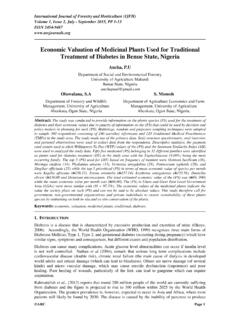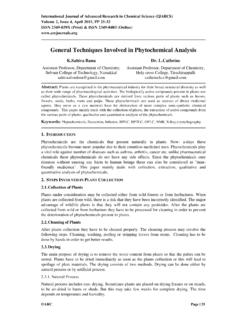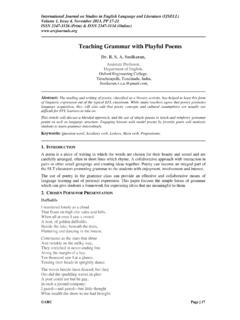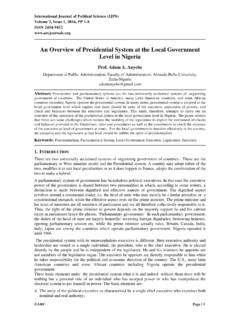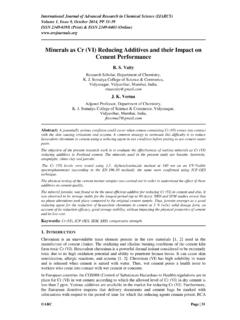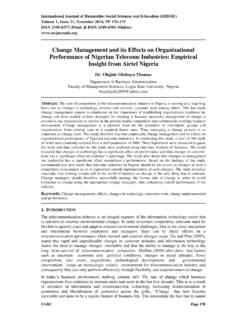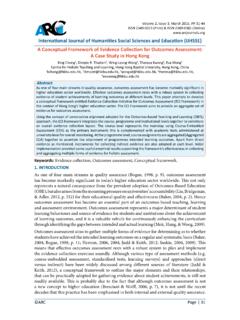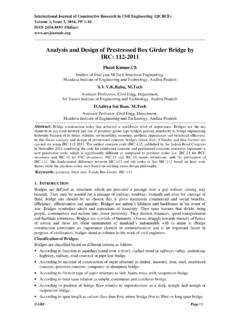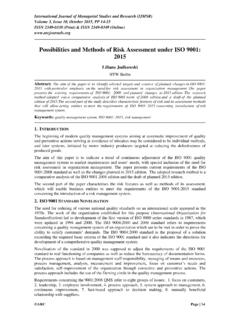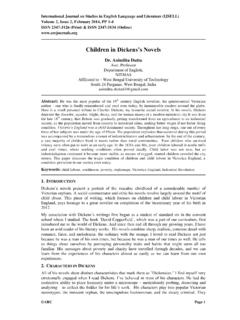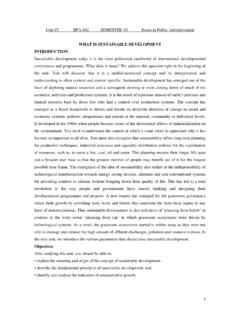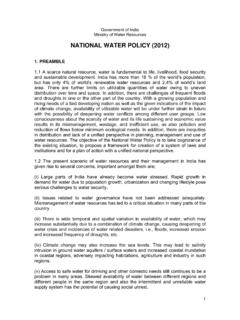Transcription of Environmental Sustainability: Ethical Issues
1 International Journal of Humanities Social Sciences and Education (IJHSSE) Volume 1, Issue 8, August 2014, PP 35-40 ISSN 2349-0373 (Print) & ISSN 2349-0381 (Online) ARC Page 35 Environmental sustainability : Ethical Issues Reena Patra Department of Philosophy Punjab University, Chandigarh Abstract: This article is purported to explore the Ethical dimensions of Environmental sustainability which has certain philosophical Issues .
2 It is argued in the paper that the philosophical import and the Ethical grounding for Environmental sustainability is based on the conception of nature as an environment rather than that of nature as a mere object for sustenance. Such conception of nature implies the concept of sustainability as a positive value in the society. In the case of nature as environment, nature becomes the natural habitat of man and is always supportive of human existence. The second issue that concerns the present paper pertains to Ethical sustainability of environment, which is based on the Ethical commitments of average people if adequate Environmental protection is to occur.
3 As such, Environmental ethics is concerned with the issue of responsible personal conduct with respect to sustainability of natural resources. The Ethical issue at present is the recovery of nature or regenerating the nature as an environment rather than as a mere object. Keywords: environment, sustainability , ethics, human, values, natural-resources. 1. INTRODUCTION Environmental ethics is a discipline in philosophy that studies the moral relationship of human beings to the values and moral status of the environment.
4 Although nature was the focus of nineteenth and twentieth century philosophy, contemporary Environmental ethics emerged as an academic discipline only in the 1970s. Of course, pollution and the depletion of natural resources have not been the only Environmental concerns since that time: dwindling plant and animal biodiversity, the loss of wilderness, the degradation of ecosystems, and climate change were the Issues that have implanted themselves into both public consciousness and public policy over subsequent years.
5 Philosophers began to rediscover ideas about nature found in Rousseau, Kant, Hegel, H lderlin, Nietzsche, Benjamin, and Heidegger; thinkers who regard themselves as belonging to the continental tradition have been at the forefront of this development (Foltz 1995; Foltz and Frodeman 2004). Some have argued for the relevance of phenomenology to Environmental consciousness and the understanding of the human condition (Seamon and Mugerauer 1985, Abram 1996, Toadvine and Brown 2002). A phenomenological approach takes the subject s own awareness and experiences as the starting point for philosophical, aesthetic, and moral reflection.
6 For Heidegger, human beings never just exist, but rather find themselves somewhere: dasein literally means being there. Both human awareness and existence are bound up with being in places and so, it may be argued, what is valuable emerges from the interconnection and interaction of humans in their environment. Some writers have suggested that Heidegger s approach can open the way to an account of intrinsic value in nature (Thomson 2004), and others have explored the idea that there is support for deep ecological insights in his thought (Zimmerman 1994).
7 The recovery, reanimation, and novel application of the work of figures such as Husserl, Merleau-Ponty, and Heidegger might seem to bring a new depth and interest to work in Environmental philosophy, but there are also critics of such an approach, which, because of its emphasis on the emotional and spiritual links between humans and nature (Smith 2001, Casey 1993, 1997, Malpas 1999). Humans are helped or hurt by the condition of their environment, and that there ought to be some ethics concerning the environment that can be doubted only by those who believe in no ethics at all.
8 An anthropocentric ethics claims that people are both the subject and the object of ethics. Reena Patra International Journal of Humanities Social Sciences and Education (IJHSSE) Page 36 Nature is a means, not an end in itself. Humans deliberately and extensively rebuild the spontaneous natural environment and make the rural and urban environments in which they reside. We care about the quality of life in these hybrids of nature and culture. Ethics arises to protect various goods within our cultures.
9 2. CULTURE Culture is expressed in a way a society lives, how its people behave, and in its religious expressions. These will alter according to time and place. In particular, the way in which humanity sees itself in relation to its surroundings is a fundamental reflection of human culture. Sometimes, human culture may not be in unison with the surroundings and it may have a harmful effect on nature. These days human beings have gone astray and are destroying nature. Whenever nature stands in the way of what they want, she is pushed aside.
10 Such behavior, which is not in harmony with nature, is not really human culture. In Indian perception, manav (man) is a human being who perfectly respects the nature and danav (demon) is one who misuses nature. It is not wise to go against nature. History has shown that those cultures, which are not respectful to nature, do not last long; they bring about their own downfall. Vedic culture on the other hand, has lasted for many thousands of years and is still visible as self-perpetuating and regenerating (Prime 1994:18-20).
